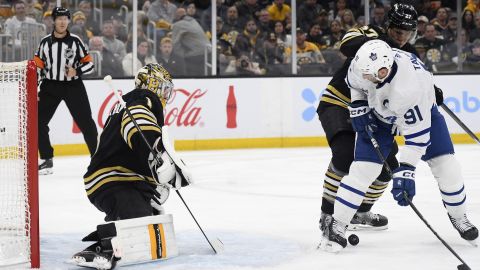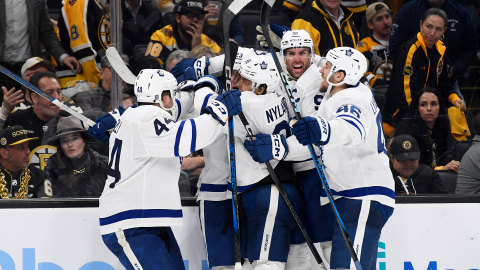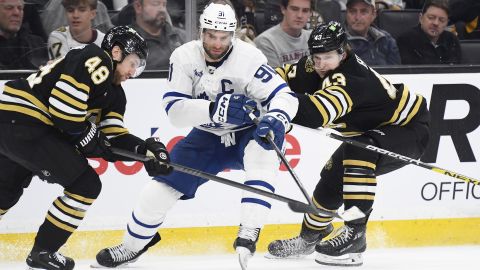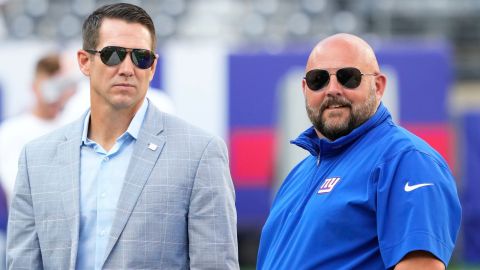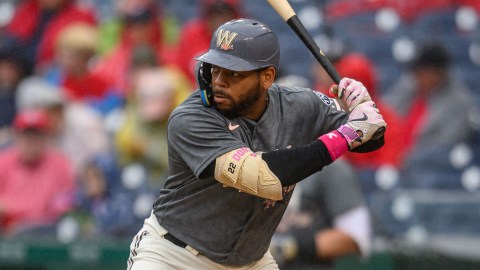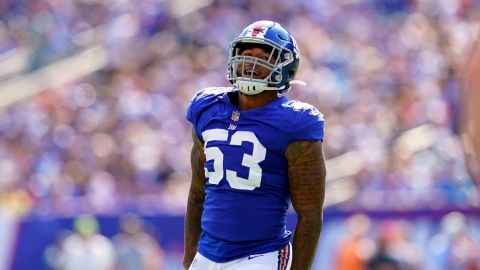There’s not much debate at all: When the Bruins and Maple Leafs meet in the first round of the Stanley Cup playoffs, Auston Matthews will be the best player on the ice any time he hops over the boards.
The Maple Leafs forward is having a career season, even by his lofty standards. He led the NHL with 69 regular-season goals and added 38 assists for good measure. He might be the most dangerous player on the planet with the puck on his stick. And it’s on his stick a lot.
That puts Jim Montgomery and the rest of the Bruins in the uncomfortable and unenviable position of trying to formulate and carry out a game plan to slow down (stopping is wishful thinking) Matthews.
That’s something the Bruins might need to remind themselves as the series carries on. Matthews is probably going to get his. In a lot of ways, the best way to “stop” or “slow down” Matthews might be to not worry as much about what he’ll be able to do but rather stopping those around him.
Story continues below advertisement
Ideally, of course, you want to stop everyone, Matthews included. However, if the 26-year-old scores a goal per game over the course of the series but the Leafs only get one or two other tallies per contest from the rest of the roster, the Bruins will probably take their chances with that.
Either way, this is a massive test for Charlie McAvoy and the rest of the Bruins’ defensive corps. McAvoy has established himself as a legitimate top-pairing defenseman in the NHL. Putting the clamps on Matthews and his line, the best one can, would go a long way in further cementing him as an elite blueliner.
More Bruins
It helps that the Bruins can mix and match on the back end, something that is especially valuable with the benefit of home ice where Montgomery’s privilege of last change allows him to dictate matchups. That might start with McAvoy skating alongside Hampus Lindholm, but Montgomery won’t be afraid to mix it up.
“It’s good to have two really good defensemen playing out there.,” the Bruins coach said Friday. “Who knows, we’re very flexible. We’ve moved our defensemen all around … just because they’re slotted together doesn’t mean they’re going to play together the entire game.”
Story continues below advertisement
Those minutes, especially against the best opponents, are earned, though.
“I think in the regular season you can give a little more leash to certain players, just to see how they handle certain matchups,” he explained. “Come playoff time, you’re going to have to be a little more strict about who you’re utilizing against certain people.”
Another way to slow down Matthews and the entire Leafs offense? Serve them a dose of their own medicine. Not even a gifted goal scorer like Matthews is a threat to score 200 feet away from the net when he’s being forced to defend in his own end. The Bruins can’t match Toronto’s offensive firepower, but if they can hem in the Leafs and make Toronto defend, that serves two purposes: The first is keeping the Leafs out of the offensive zone, and it tires those players down.
The thing with Matthews, though, is that he has turned himself into an incredibly valuable player in his own end, too. As NHL on TNT researcher Chris Jastrzembski uncovered, Matthews is just one of two players in the last 20 years to record 30 goals, 90 blocked shots and 80 takeaways in a season. The other was Flyers forward Mike Richards, who scored exactly 30 goals in 2008-09. Blocked shots and takeaways are slightly deceiving stats — it’s theoretically better to have the puck than be trying to take it away or block it — but it does speak to Matthews’ strength on his own stick in any zone.
Story continues below advertisement
Ultimately, the Bruins need to control what they can control. As Montgomery also noted Friday, the most successful teams in the playoffs are the ones who can stick to and execute their game plans while winning the countless smaller battles for the most valuable spots on the ice. You can’t lose your own man in your end. You can’t fly the zone at the wrong time. D-men can’t mistime or misjudge when they pinch. Even on the power play, the Bruins have to ensure they are careful with the puck and are hustling back to avoid odd-man rushes in any situation.
They can’t lose track of Matthews, either, but they might need to be comfortable knowing he’s going to be a factor at some point in the series. Whether the Bruins can advance might depend on how often they let it happen and what they can do to slow those around him.
Featured image via Brian Fluharty/USA TODAY Sports Images









